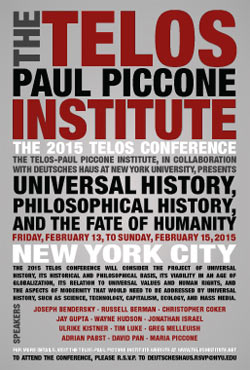If the phrase “asymmetrical warfare” is taken to connote scenarios where “one side is possessed of overwhelming power with respect to its adversary,” together with manifold embodiments “of asymmetry in media representations, ideology, religion, sub- and supra-national actors, the environment and even psychology,” then there would appear little doubt that today’s world is pervaded by such conflict. Necessarily, the unique historical conditions of the present, globalizing era—with its fragmenting as well as revanchist states, and its dizzying technological accelerations—are evoked by “new wars” that embroil a proliferation of non-state actors, along with states who believe that they should rightly monopolize (or be immune from, as the case may be) such asymmetrical modalities as nuclear arsenals, mercenary forces, drones, cyberattacks, and propaganda innovations.
|
Consider the Aristotelian maxim that humankind “is by nature a political animal,” whose capacity for speech, unique “among the animals[,] . . . serves to reveal the advantageous and the harmful, and hence also the just and the unjust.” If one accepts this dictum (and, crucial to this article’s line of thinking, by no means must one necessarily adhere to Aristotle’s rationalist model of “man,” nor any other universalist account of humanness), then the ceaseless question remains: what specific sort(s) of speaking, morally reasoning animal might the human be read as constituting, from within the interpretive mindset of a particular historical and civilizational milieu? Of course, this question presupposes, in a manner that may well be at odds with the anthropological premises of a universalist modern political doctrine like human rights, that, rather than exhibiting a fixed, unitary essence, the human acts as a signifier; as such, this human signifier might potentially refer to myriad worldviews, and sources and assemblages of contextualizing meaning, across which the understanding of humanness can be differently constructed and construed. |
||||
|
Telos Press Publishing · PO Box 811 · Candor, NY 13743 · Phone: 212-228-6479 Privacy Policy · Data Protection Copyright © 2024 Telos Press Publishing · All Rights Reserved |
||||
 The emerging exhaustion of the Westphalian paradigm of state sovereignty intimates the profoundly contestable and contingent character of modern, Western claims for a universal model of history. Over several centuries, the state has embodied and enforced foundational postulates, such as the pre-eminence of the individual knowing subject, and the imagined divide between religious and secular realms of existence and authority (with the latter sphere effectively internalizing the sacred import of the former). At present, though, the state’s tenuousness, and yet in key instances fierce tenacity, amidst a world of potent transnational forces, portends the urgency for alternative conceptions of the meaning and arrangement of human life. Contemporary Middle Eastern quandaries are especially illustrative of this predicament: for example, the disintegration (as in Iraq, Syria, Libya) or, then again, coercive retrenchment (viz., Egypt) of state formations and nationalist identities; or, to take another sort of instance, the chimerical prospects for coexistence, or even bare existence, among conflicting national communities, as in Israel/Palestine. Are there political paradigms beyond the Westphalian state that could help to integrate plural traditions in pursuit of less exclusionary, and more just, historical possibilities?
The emerging exhaustion of the Westphalian paradigm of state sovereignty intimates the profoundly contestable and contingent character of modern, Western claims for a universal model of history. Over several centuries, the state has embodied and enforced foundational postulates, such as the pre-eminence of the individual knowing subject, and the imagined divide between religious and secular realms of existence and authority (with the latter sphere effectively internalizing the sacred import of the former). At present, though, the state’s tenuousness, and yet in key instances fierce tenacity, amidst a world of potent transnational forces, portends the urgency for alternative conceptions of the meaning and arrangement of human life. Contemporary Middle Eastern quandaries are especially illustrative of this predicament: for example, the disintegration (as in Iraq, Syria, Libya) or, then again, coercive retrenchment (viz., Egypt) of state formations and nationalist identities; or, to take another sort of instance, the chimerical prospects for coexistence, or even bare existence, among conflicting national communities, as in Israel/Palestine. Are there political paradigms beyond the Westphalian state that could help to integrate plural traditions in pursuit of less exclusionary, and more just, historical possibilities? 






